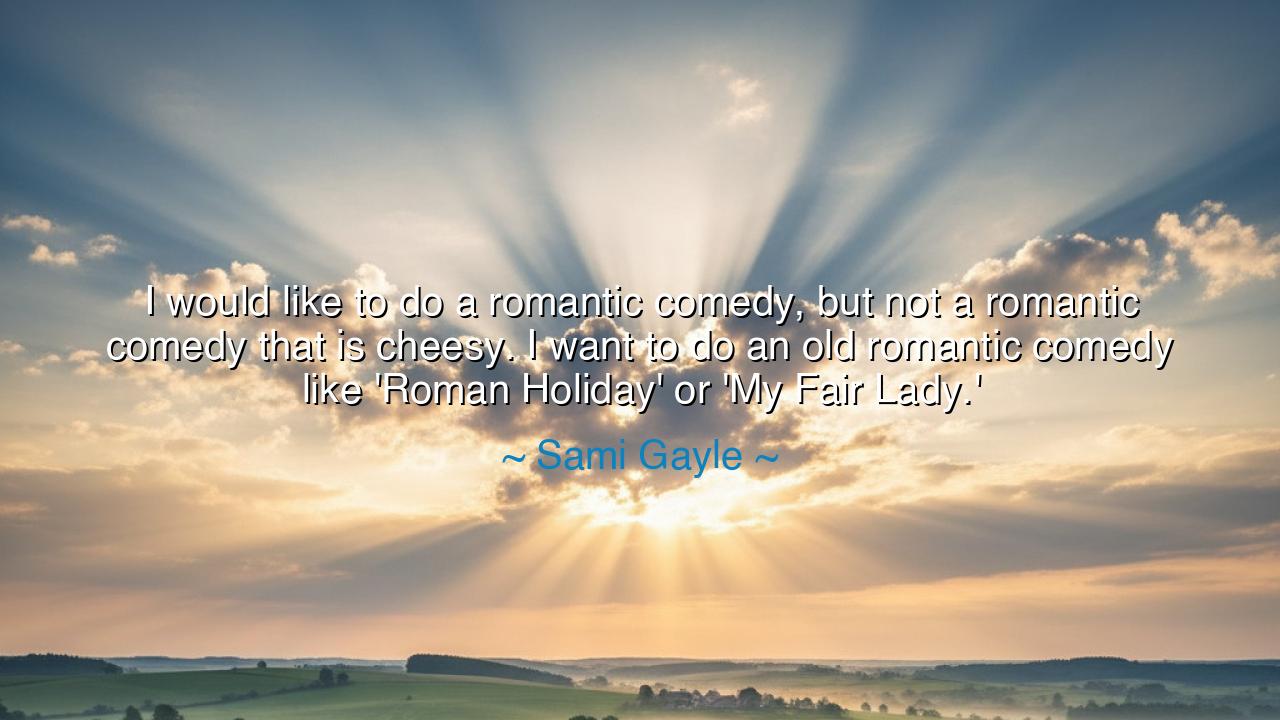
I would like to do a romantic comedy, but not a romantic comedy
I would like to do a romantic comedy, but not a romantic comedy that is cheesy. I want to do an old romantic comedy like 'Roman Holiday' or 'My Fair Lady.'






Gather around, my children, for the words of Sami Gayle bring with them the wisdom of the past, a yearning for a time when love and romance were expressed with the elegance and grace of an era long gone. She spoke thus: "I would like to do a romantic comedy, but not a romantic comedy that is cheesy. I want to do an old romantic comedy like 'Roman Holiday' or 'My Fair Lady.'" These words, though spoken in the modern world, reflect the yearning for a classic time when love was expressed not through silliness, but through profound connection, deep emotion, and moments of genuine transformation. Let us reflect on the meaning of these words, for they are more than a simple request for a film—they are a desire to return to the heart of romantic storytelling.
In the world today, romantic comedies have become an industry of fleeting moments, of fast-paced humor, and of quick fixes to the complexities of love. The laughter is often loud, the plots simple, and the moments of connection, shallow. But Sami Gayle, wise beyond her years, yearns for something different—for something deeper, more authentic. She desires a return to the romantic comedies of the past, where the love between two people unfolded slowly, where transformation was at the heart of the story, and where characters grew through their relationship. The cheesy comedies of today, though amusing, lack the depth that the older films embodied.
Let us look back, my children, at Roman Holiday, a film where Audrey Hepburn and Gregory Peck created magic with their delicate portrayal of love. Their characters, though brought together by fate, were separated by duty and circumstance. The romance that blossomed between them was not the result of simple misunderstandings or contrived plots, but the organic unfolding of two people discovering each other’s hearts. It was a love that changed them, that made them better. It was not a love without pain, but a love full of sacrifice, growth, and honesty. This, my children, is what Sami seeks—the portrayal of love that is not cheapened by superficiality but instead elevated by depth, heart, and truth.
Likewise, My Fair Lady offers us another glimpse into this kind of love—one that transforms not just the characters but the viewer as well. In the story of Eliza Doolittle and Professor Higgins, we see a tale of growth, of learning, of change. At first, it is a love that seems based on teacher and pupil, but through their journey together, both characters evolve, shedding their previous selves to become something more whole. This love is not without struggle, but it is through the struggle that their bond strengthens. The characters of Higgins and Eliza are not simply engaging in a romantic dance—they are learning about themselves and each other in the process, and that, my children, is what makes their love story timeless.
The ancient Greeks, in their wisdom, understood the power of transformation in love. They spoke of Eros, the god of love, whose arrows could strike the hearts of mortals and change them forever. But in their myths, love was never depicted as a simple pursuit of pleasure—it was a force of nature that led to growth, self-discovery, and often, sacrifice. Hercules, though a warrior, underwent trials not only of strength but of the heart, learning from each challenge and emerging stronger in his understanding of love and duty. Similarly, the romantic comedies of Roman Holiday and My Fair Lady reflect the idea that love—true love—is not about simple affection or fleeting moments of happiness. It is about a deep, transformative journey that reshapes the soul.
And so, my children, what lesson do we take from this? It is this: love is not a thing to be taken lightly, nor is it something to be cheapened. True love, as depicted in the great romantic comedies of old, is about growth, sacrifice, and the willingness to be changed by another. It is not simply the pursuit of happiness, but the journey of becoming a better person through connection. In a world that often seeks instant gratification and easy answers, we must remember that love requires patience, understanding, and a willingness to grow together.
Thus, I encourage you, dear children, to seek out the romantic comedies of the past, not for their entertainment value alone, but for the lessons they teach about the depth of love. Let them remind you that true connection is built not on the surface, but on the slow, steady work of understanding and transformation. Let love, like in the great stories of old, not be a fleeting moment, but a journey that changes you, that shapes your soul, and that makes you rise to be your best self. And when you seek love, seek it in its most authentic form—one that is bound not by superficial gestures, but by the deep, lasting bond of shared growth and mutual respect.






AAdministratorAdministrator
Welcome, honored guests. Please leave a comment, we will respond soon